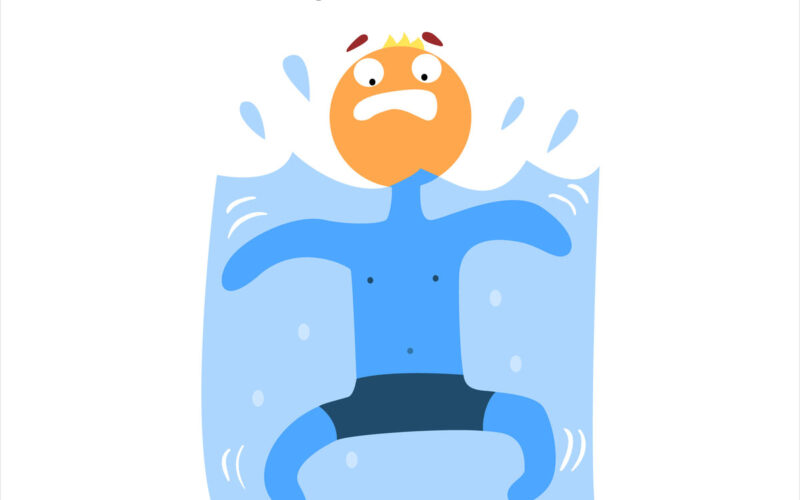Aquaphobia, or fear of water, is a relatively common phobia. As with all phobias, the severity varies greatly depending on the individual. Some people are only afraid of rough waves, while others are afraid of baths. Some people can’t stand the sight of large bodies of water. Aquaphobia can be so pervasive in some people that even being splashed with water can trigger a phobic reaction (Fritscher, 2021). Nausea, dizziness, numbness, shortness of breath, increased heartbeat, sweating, and shivering are common physical responses to aquaphobia (Change that’s right now, 2016; Otta & Ogazie, 2014, as cited in Aboo Bakar and Aboo Bakar, 2017).
Causes
Deep open water frightens 64% of American adults (Popke, 2009, as cited in Aboo Bakar and Aboo Bakar, 2017). Some people may have a natural fear of drowning. Tension can cause this sensation when a swimmer lifts his or her head out of the water to inhale (Cross, 2016, as cited in Aboo Bakar and Aboo Bakar, 2017). The most common cause of aquaphobia is a negative experience with water. A person is more likely to develop aquaphobia if they have had a near-drowning experience, a shipwreck, or even a bad swimming lesson. Negative experiences do not have to directly affect a person in order for them to develop a fear of water. After the release of the film Jaws in 1975, reports of a general fear of water increased dramatically (Fritscher, 2021).
Treatment
Aquaphobia, like most specific phobias, responds well to treatment. Cognitive-behavioral therapy is particularly well-liked. This therapy will teach you how to recognize and replace negative thoughts about your aquaphobia with more positive messages. It will also teach you how to deal with fear. Exposure to the phobia is a common component of most phobia treatments.
Conclusion
Aquaphobia can be terrifying for those who suffer from it. Overcoming the fear of phobias is a difficult task. There are numerous advantages to overcoming phobias. In the case of aquaphobia, overcoming the fear of water can greatly improve a variety of experiences. When going to a pool with a team, being afraid of water can make certain situations awkward or uncomfortable. Overcoming aquaphobia is possible with the assistance of a professional therapist.
References
Aboo Bakar, R. and Aboo Bakar, J. (2017). Aquaphobia: Causes, Symptoms and Ways of Overcoming It for Future Well-being Article Information. International Academic Research Journal of Social Science, [online] 3(1). Available at: https://www.iarjournal.com/wp-content/uploads/IARJSS2017_1_82-88.pdf [Accessed 28 January 2023].
Fritscher, L. (2021). Coping With the Fear of Water. [online] Verywell Mind. Available at: https://www.verywellmind.com/aquaphobia-causes-symptoms-treatment-2671845 [Accessed 27 January 2023].
